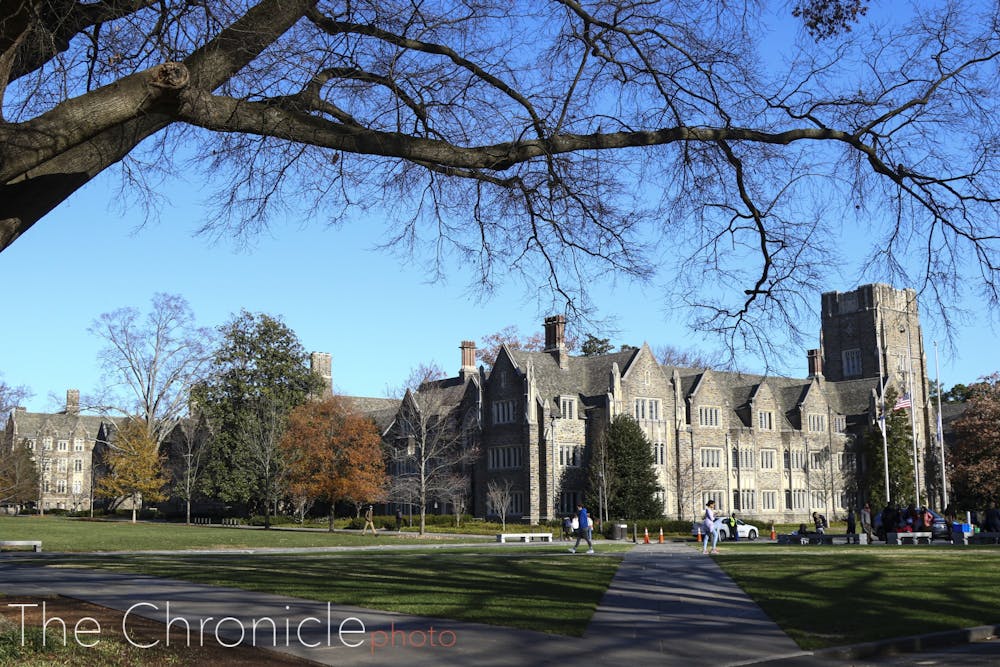At its Friday panels and Saturday meeting, the Duke Board of Trustees affirmed its goals of promoting development and entrepreneurship in Durham and discussed the limitations of the new NCAA rules.
The Board has committed itself this year to learning how the University can better commercialize its research and collaborate with regional partners. At its second meeting of the year, trustees heard from business and government leaders in Durham and the Triangle.
President Vincent Price and Board Chair Jack Bovender spoke with The Chronicle after the Saturday morning meeting.
Durham, America’s next hotspot?
On Friday, trustees heard from three panels. The first dealt with Durham’s economic development, featuring city and regional leaders such as Durham City Manager Thomas Bonfield and Johnson Akinleye, chancellor of North Carolina Central University.
The second panel informed trustees on Durham’s entrepreneurial scene. The panel was made up of business leaders, investors and researchers. Finally, trustees learned about what peer institutions like Johns Hopkins University and Columbia University are doing in regard to research commercialization.
Price said that Duke’s long-term goal is to promote economic development and innovation in the region, which requires finding the best faculty, investing in science and technology and establishing formal systems for research commercialization.
“More than anything else, it means cooperation with community leaders, local corporations to create a system where there's as little friction as possible and as much promotion of these research discoveries as possible, so you shorten the timeline from when something's discovered on campus and its translation into a useful product or service in the community,” he added.
Bovender and Price said that the University wants to build a region that’s attractive to entrepreneurs, businesses looking to add a headquarters and scientists alike, à la Silicon Valley or Cambridge. The Triangle is already in a strong position, Price said, but there’s room to grow.
Bovender described this growing process as an iterative one, meaning Duke wants to build on past successes until it has reached a point where talented people are naturally drawn to Durham.
"We're a global institution—we do things across the world—but if we aren't doing our best work here at home, we're underperforming," Price said.
New NCAA rules: A ‘Pandora’s Box’
At Saturday’s meeting, Athletic Director Kevin White updated the trustees on the college sports landscape. One of the topics he went over was student-athletes making money on their name and likeness according to new NCAA policy.
Bovender said Duke is in a tough situation because the rules aren’t clearly defined yet. But if the rules are structured in a smart way, then there shouldn’t be a problem.
"There's a part of me that says, 'I wish this Pandora's box had not been opened’," he said.
Price and Bovender pointed out two potential problems that students profiting off their likeness could bring.
It could create an opportunity for “non-market-driven practices,” Price said. He and Bovender described how big boosters for a university could promise an advertising deal to a recruit, which could unfairly sway the recruit’s decision.
There’s also the possibility that different states have different regulations regarding athletes being able to make money. In October, California became the first state to pass a law allowing student-athletes to profit off their likeness. Duke supports a set of federal regulations.
"We're facing what may look like a pastiche of state-by-state regulations and laws and that is completely unworkable," Price added.
Get The Chronicle straight to your inbox
Sign up for our weekly newsletter. Cancel at any time.

Jake Satisky was the Editor-in-Chief for Volume 115 of The Chronicle.

